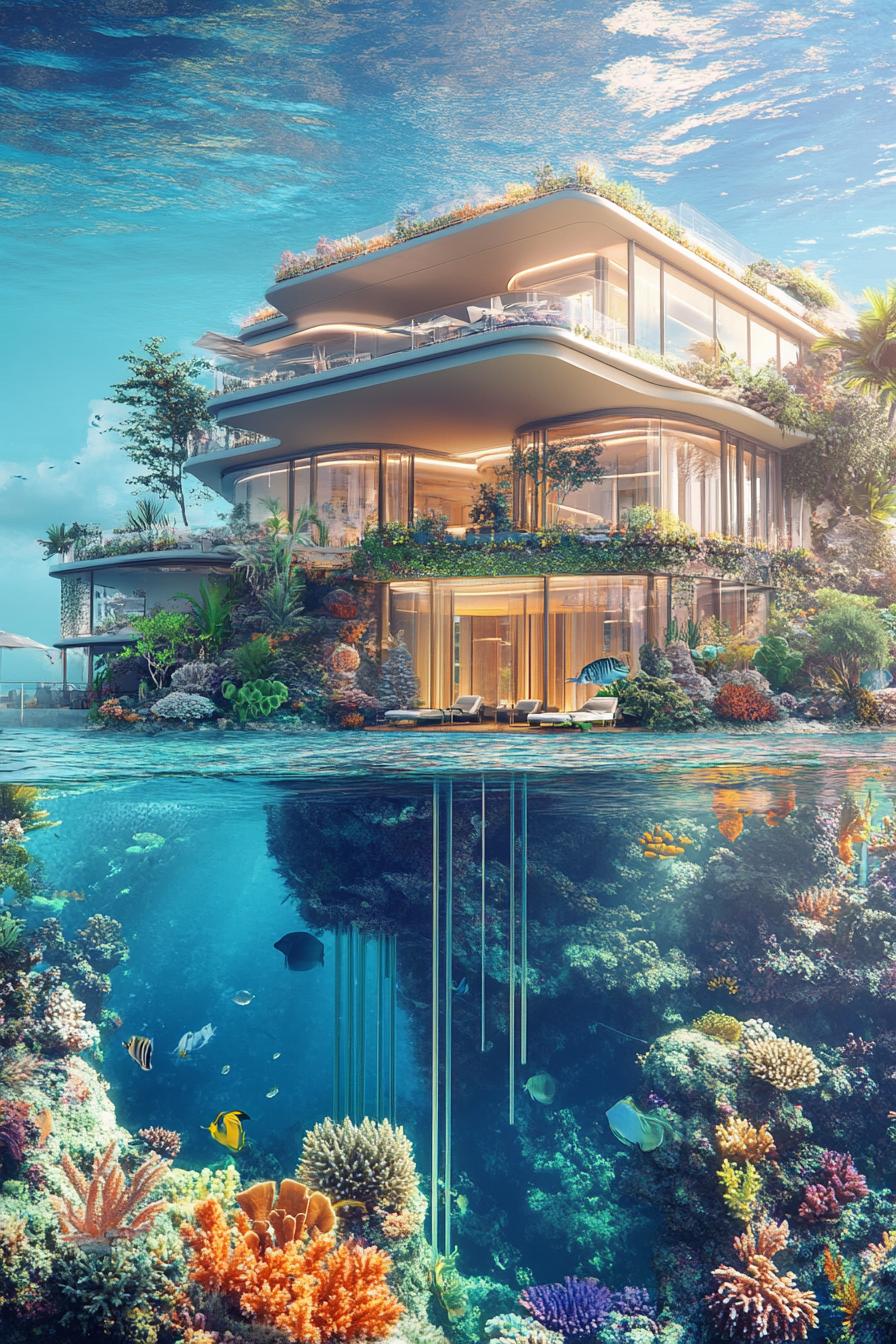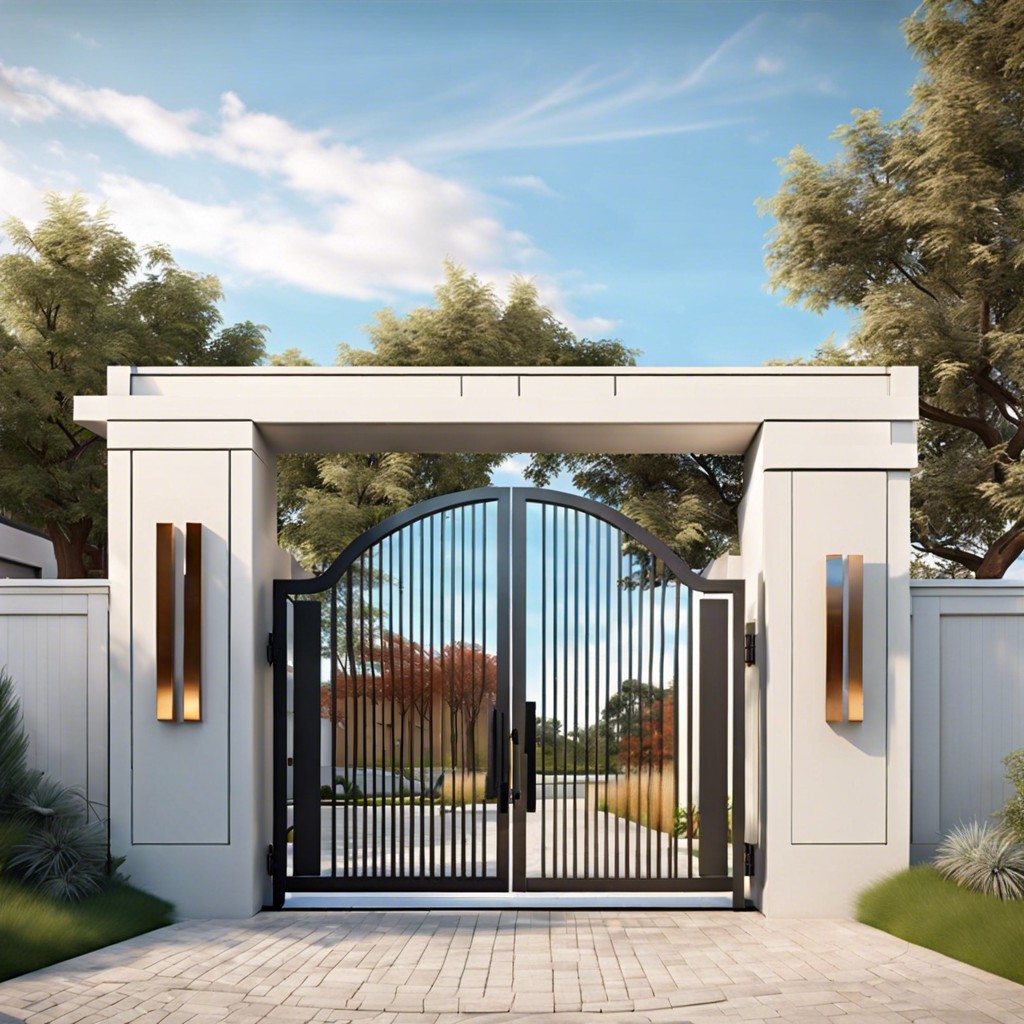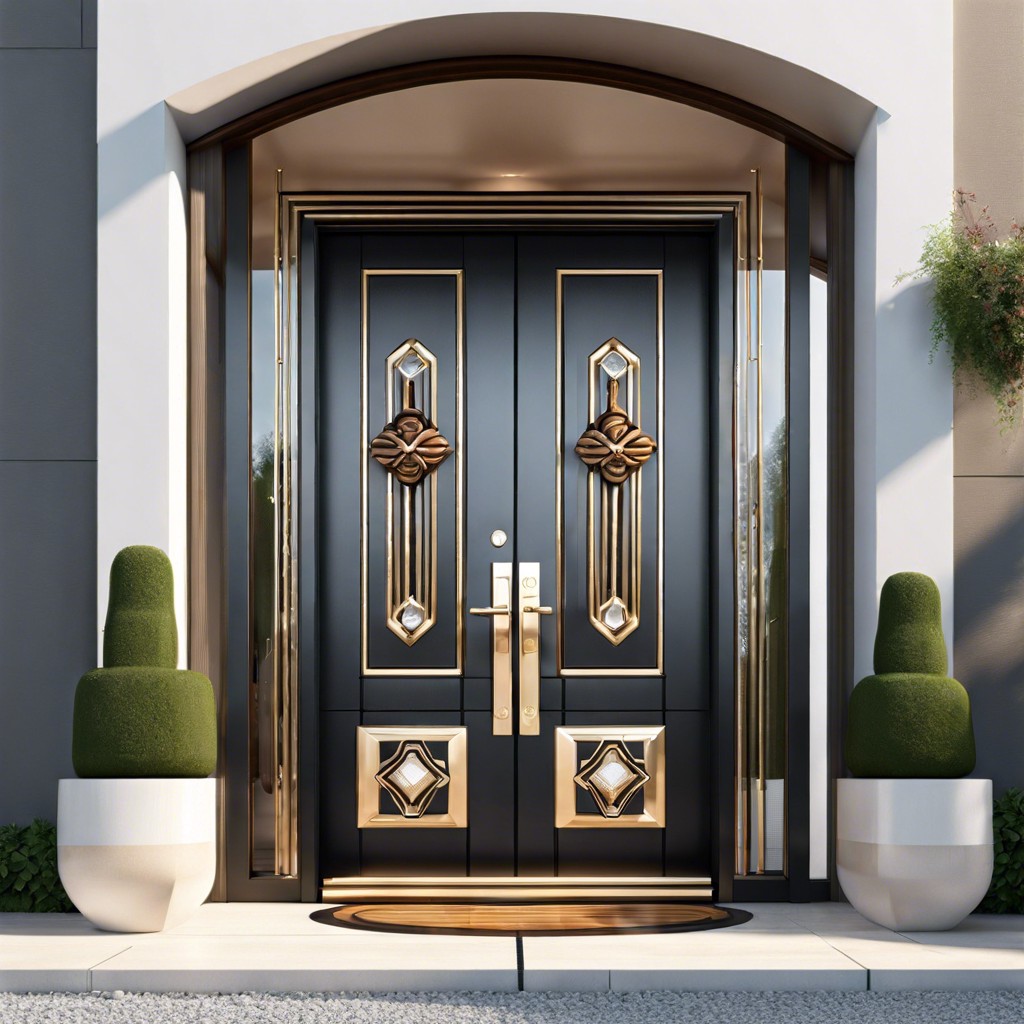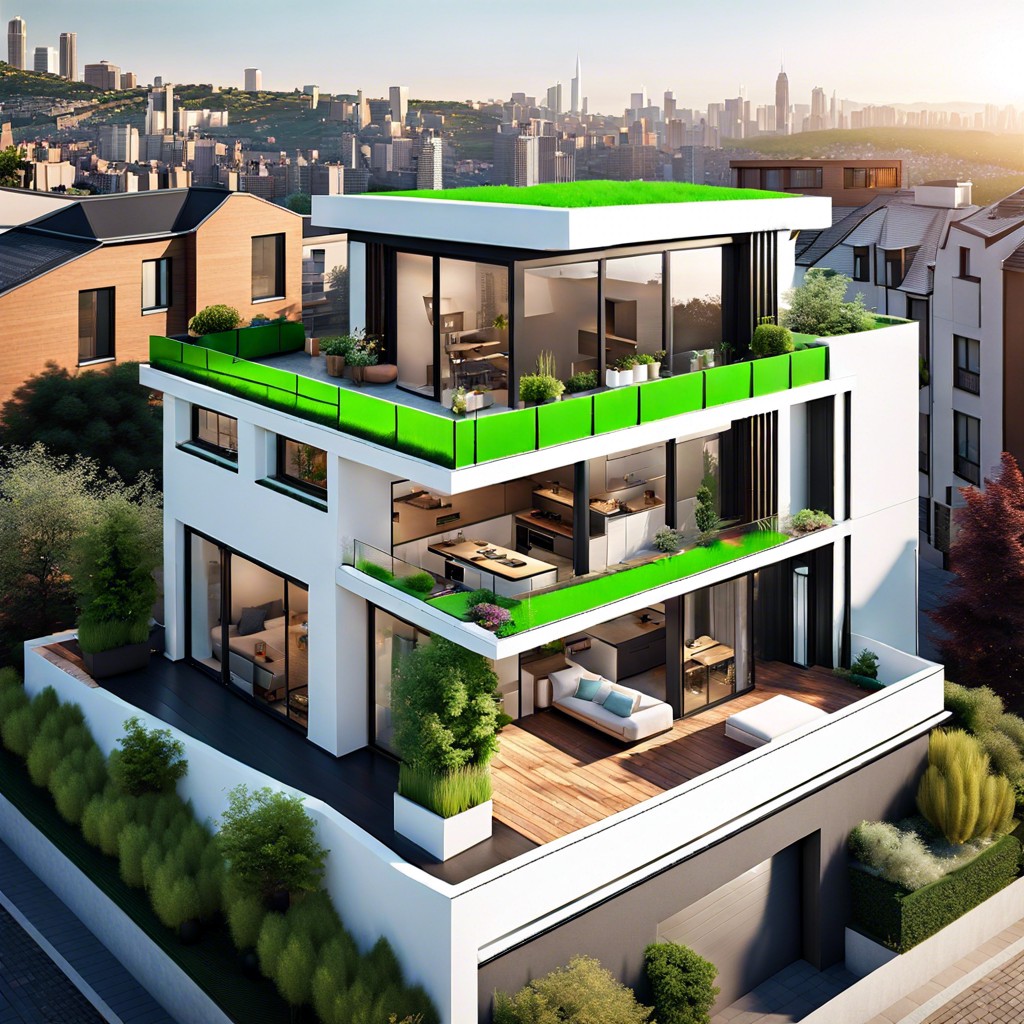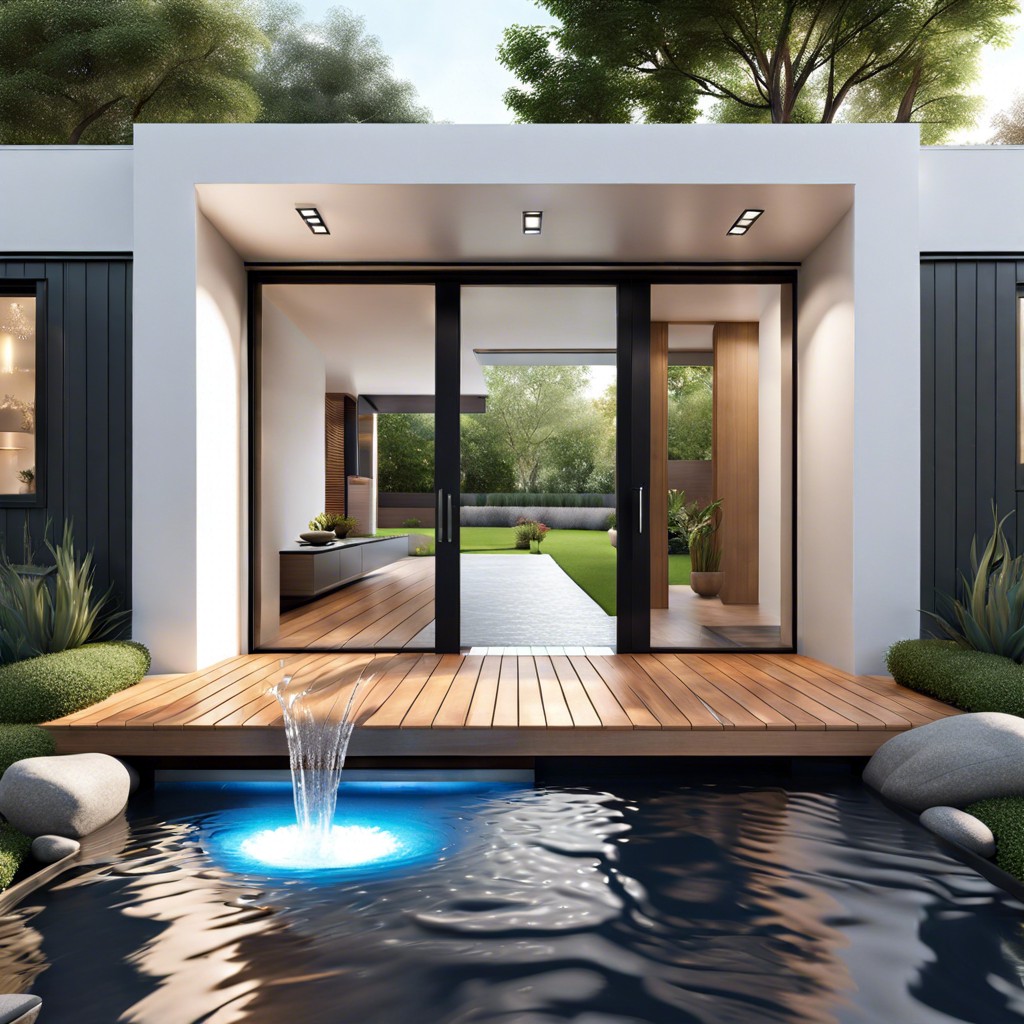Last updated on
Yes, a guest house can significantly increase the value of a property due to added square footage and potential for rental income.
Adding a guest house to your property can indeed enhance its value, serving both as an attractive feature for potential buyers and a potential source of rental income, making your property investment more profitable. This article will delve into the specifics of how a guest house increases property value, the cost-benefit analysis, and important considerations such as local zoning laws, environmental impact, and sustainable construction methods for guest houses.
Enough information to guide you in determining if it’s a worthy investment for your situation. So, stick around to uncover the full scope, benefits, and tips on adding a guest house to your property, backed by experts’ data and real estate metrics.
Key takeaways:
- A guest house can significantly increase property value.
- Consider zoning laws and regulations before building.
- Choose the right type of guest house for your needs.
- Understand the cost of building a guest house.
- Consider the potential for rental income.
Considerations Before Building

When pondering the addition of a guest house, various factors come into play, requiring thoughtful planning. Initially, scrutinize your motivation for building; whether it’s for hosting family, expanding living space, or adding rental income, purpose will direct design and investment.
Next, the feasibility of construction must align with your property size and local building regulations, ensuring no violations will halt your project. Furthermore, assessing the impact on your property’s resale value is crucial. While a guest house may attract a broader market, the financial benefits depend on current real estate trends.
Additionally, consider the impact on your daily life, from construction disturbances to the ongoing responsibilities of property maintenance and the increased interactions with future guests or tenants. Each of these elements shapes the blueprint for a successful guest house addition, creating a space that’s both functional and financially sound.
Types of Guest Houses
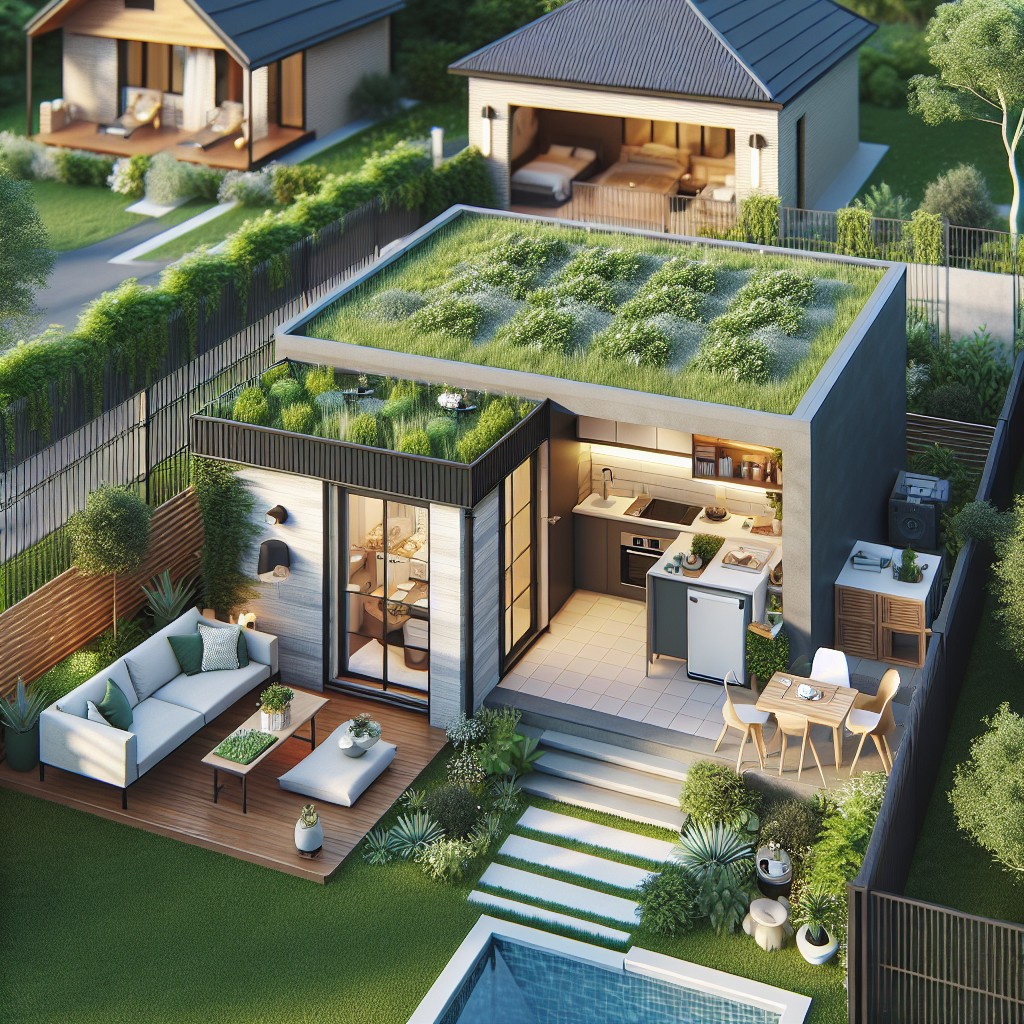
Detached Guest Houses offer complete separation from the main residence, often providing full amenities including a kitchen, bathroom, and living space. This option maximizes privacy and independence for guests.
Attached Guest Houses share a wall with the main home, like an extension or built as a part of the existing structure. They are often more affordable to construct due to shared utility connections and materials.
Garage Apartments utilize the space above a garage. They’re cost-effective and can be ideal for smaller guest accommodations, leveraging existing structures on the property.
Accessory Dwelling Units (ADUs), sometimes referred to as granny pods, are compact, self-contained living spaces on the same lot as a single-family home. They can be detached, attached, or even a repurposed existing room.
Prefabricated Guest Houses are factory-built units assembled on-site. They offer quicker installation times and can be cost-saving, with less disruption to the homeowner’s property.
Modular Guest Houses are similar to prefabricated ones but are often more customizable. They come in modules which are then pieced together on-site to form a complete structure.
Tiny Houses on Wheels are a mobile and flexible guest house option. They can be moved as needed and are ideal for non-permanent situations or where zoning laws are restrictive regarding permanent structures.
Conversion of Existing Spaces involves repurposing spaces such as basements, attics, or large storage areas into guest accommodations. This can be more economical but may involve significant remodeling to ensure comfort and legality.
Cost of Building a Guest House
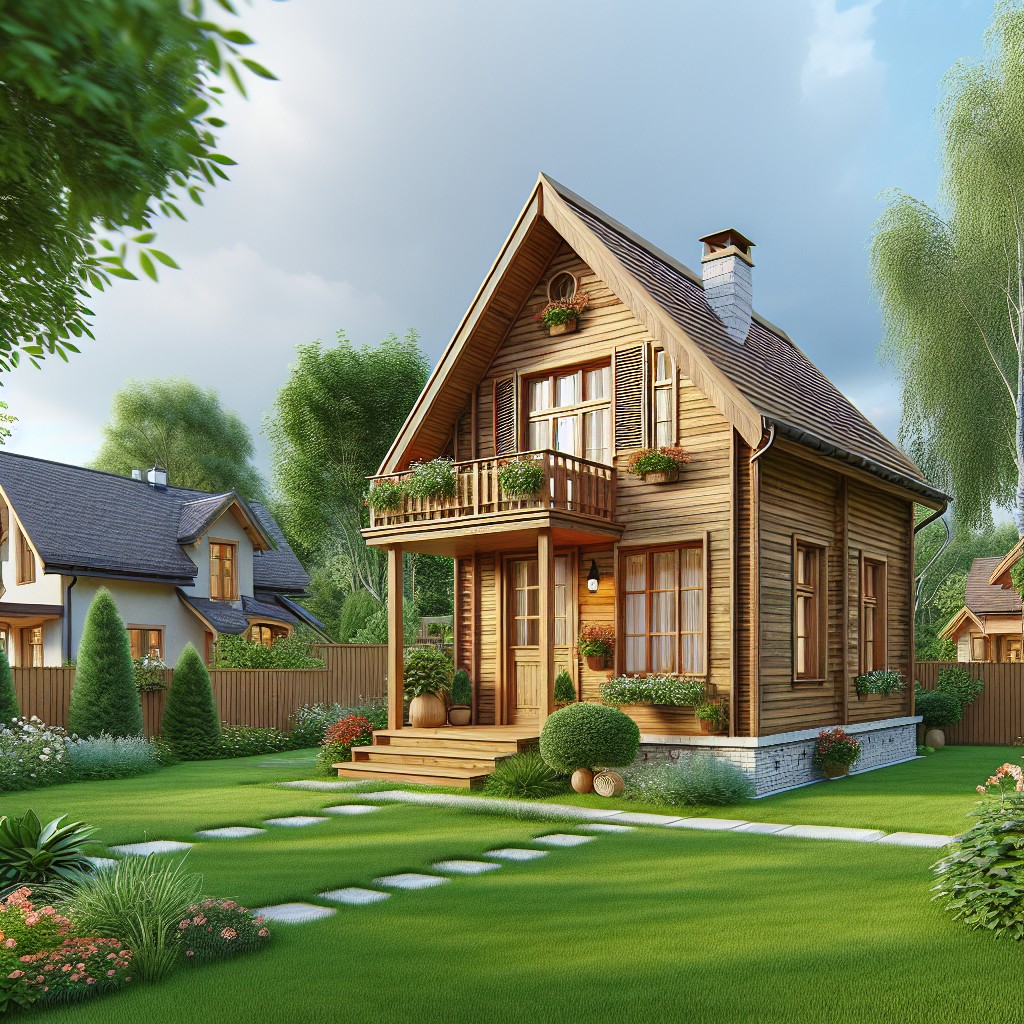
Construction expenses for a guest house can vary widely based on factors such as size, location, materials, and the level of finish desired. Here are key points to keep in mind:
- Size Matters: The cost per square foot generally decreases as the size increases, thanks to economies of scale. However, larger guest houses will inherently cost more overall.
- Location Influences Cost: Labor and material costs differ by region. Urban areas might have higher prices due to demand, while rural areas could face additional transportation fees for materials.
- Material Choices: Selecting high-quality materials will increase durability but also raise the initial investment. Alternately, cost-effective options can be more budget-friendly, with potential trade-offs in longevity or aesthetics.
- Prefab or Custom Build: Prefabricated units can be cost-effective and quick to install, while custom builds offer more design flexibility but usually come with a heftier price tag.
- Contractor Selection: Labor costs can fluctuate based on the contractor’s expertise and current workload. Soliciting multiple bids helps in securing a competitive price.
- Permits and Fees: Local building permits and fees must be factored into the overall budget, as they are mandatory for legal construction.
- Unexpected Costs: Allocating a buffer for unforeseen expenses can prevent financial overextension, ensuring that the project remains feasible throughout unexpected complications.
By understanding these cost drivers, homeowners can budget more effectively and make informed decisions about the scope and scale of their guest house project.
Potential for Rental Income
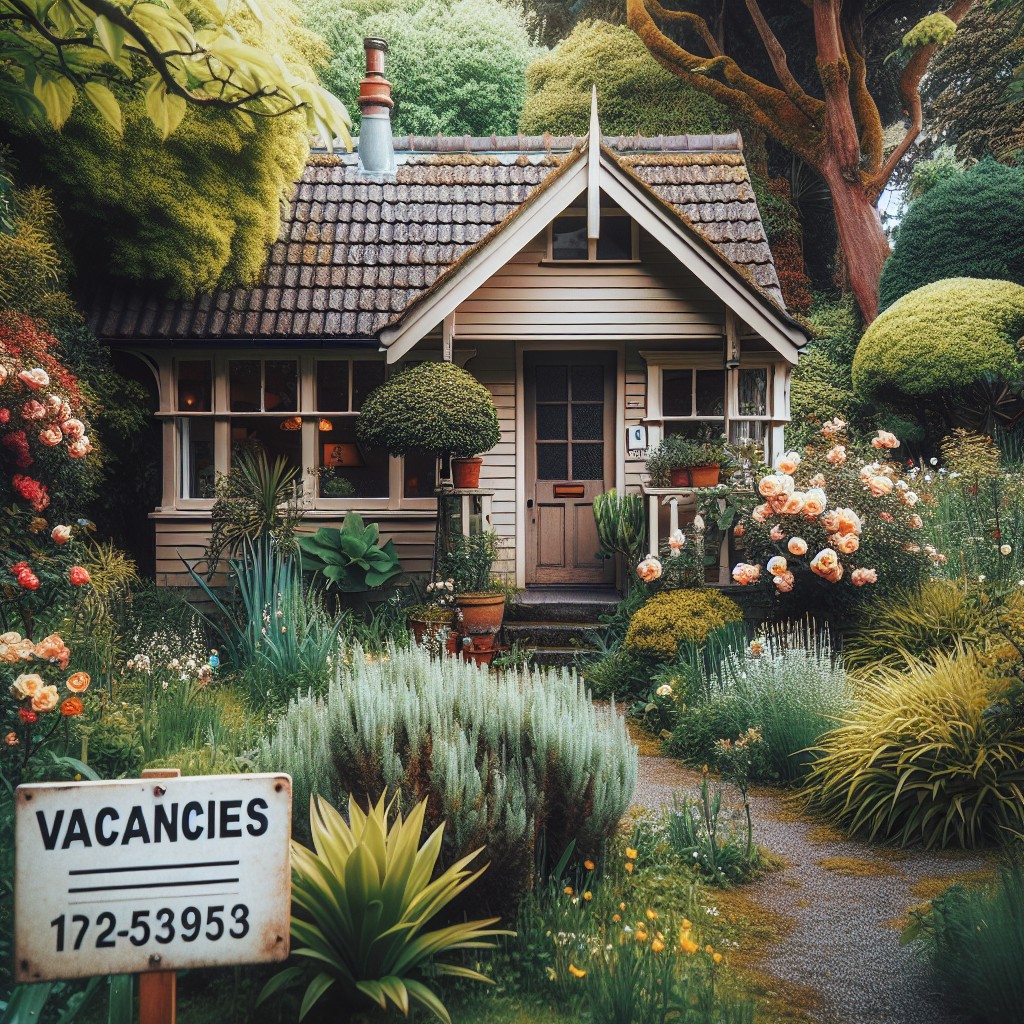
Guest houses offer the opportunity to generate substantial rental revenue. This can be approached in various ways, each suited to the homeowner’s preferences and local market conditions. Here are a few considerations:
1. Long-Term Leasing: Renting out your guest house to a tenant on a long-term basis can provide a steady stream of income. This option typically involves less turnover and one can charge a competitive market rate similar to other rental properties in the area.
2. Short-Term Rentals: Platforms like Airbnb have popularized short-term renting, which can be more lucrative on a per-night basis than long-term leases. Owners have the flexibility to block out dates for personal use or adjust pricing for peak seasons.
3. Special Event Rentals: If located in an area with frequent events, festivals, or conferences, guest houses can command premium rents for short durations. It caters to attendees who may prefer a home environment over traditional hotel accommodations.
Harnessing the potential for rental income requires consideration of factors such as market demand, setting competitive rates, and ensuring a welcoming and well-maintained space for tenants. Remember to also factor in cleaning and management expenses which can affect your net income.
Legal and Zoning Considerations
Before embarking on constructing a guest house, it’s essential to navigate local legal and zoning regulations, as they significantly influence what can be built. These rules vary widely by location, and failing to comply can result in costly fines or orders to demolish non-conforming structures.
Zoning Laws: Research your area’s zoning laws to determine if building a guest house is permissible. Restrictions could include the size and height of the structure, its distance from property lines, or the types of materials you can use.
Permits: Secure the necessary building permits. These are typically required for electrical, plumbing, and structural work, ensuring that your guest house is constructed safely and to code.
Occupancy Rules: Check regulations regarding who can live there and for how long. Some localities might not allow you to rent out a guest house, or may have specific conditions under which you can.
Utilities: Understand the regulations tied to connecting utilities. Sometimes, secondary dwellings must share utilities with the main house, and in other cases, they may need separate connections, impacting both cost and feasibility.
Parking: Look into parking requirements. Additional living space often means additional parking space mandates, meaning you may need to create more parking on your property to comply.
Future Changes: Stay informed about potential zoning changes. Areas can undergo rezoning, which might affect your guest house in the future, so keep abreast of local planning developments.
Navigating these legal and zoning considerations carefully is crucial to ensure that your guest house project doesn’t hit roadblocks, ensuring a smooth building process and legal compliance.
Guest House Size and Building Restrictions
When planning for a guest house, it’s crucial to understand the size limitations and building codes specific to your area:
- Local Zoning Laws: Check with your municipality for maximum allowable size, height, and distance from the main residence. These regulations can significantly impact your design and budget.
- HOA Rules: If your property is governed by a homeowners association, review their rules as they may have strict guidelines on accessory dwelling units (ADUs).
- Utility Connections: The size of your guest house can affect the cost and feasibility of connecting to existing utilities. Larger structures may necessitate upgrades to your systems.
- Lot Coverage: Your property will have a maximum lot coverage ratio, determining how much of your land can be built upon, including all structures.
- Permits: Acquiring the necessary permits is a crucial step. The size and complexity of the project will dictate the types of permits required.
- Impact on Main Residence: Consider how the footprint of the guest house might affect your main residence in terms of light, privacy, and access to outdoor space.
By staying informed about these regulations, you can tailor your guest house project to comply with local requirements, ensure a smoother building process, and ultimately add value to your property.
Financing Options for Construction
Securing funds for a guest house begins with assessing your equity. If substantial, a home equity loan can tap into this value, offering a fixed interest rate for predictable repayment. Alternatively, a home equity line of credit provides flexible access to funds as construction progresses.
For those with less equity, a personal loan is an option but tends to come with higher interest rates. Owner-builders with a solid plan can opt for a construction loan that converts to a traditional mortgage upon project completion.
Another pathway is cash-out refinancing, where you take a new mortgage larger than your existing one and use the difference for your build. This is often preferred for its potentially lower interest rates compared to personal loans or credit cards.
Lastly, some may qualify for a government loan, like those offered by the FHA, tailored for home improvements and renovations. These loans are more forgiving regarding credit scores and offer competitive rates.
It’s important to shop around. Compare terms, interest rates, and fees from various lenders to find the best fit for your financial situation and construction needs.
Potential Return On Investment When Selling
A guest house can significantly boost your property’s market value by appealing to buyers looking for multigenerational living spaces or potential rental income opportunities. However, the actual return on investment (ROI) depends on several factors:
- Market Conditions: In real estate markets where additional living units are in high demand, a guest house can lead to a higher sale price.
- Quality and Integration: Guest houses that are well-designed and complement the main residence tend to yield a higher ROI.
- Income-Generating Potential: Properties offering immediate rental income prospects may attract investors and buyers interested in offsetting mortgage costs.
- Versatility: A versatile guest house, usable as a home office, personal gym, or studio, can draw a broader pool of potential buyers.
- Appraisals: Proper valuations that recognize the added value of a guest house contribute to achieving a higher selling price.
To gauge the potential ROI, consider consulting with local real estate experts and analyzing recent sales of homes with similar features.
The Versatility of Guest Houses for Personal Use
A guest house serves as more than just extra space for visitors; its multifunctional nature can adapt to various personal needs. Homeowners might use it:
- As a dedicated home office or studio space, creating a productive work environment separate from the main residence.
- For multi-generational living, offering a private area that keeps family members close while maintaining independence.
- As a personal gym or wellness center, providing a convenient spot for exercise and relaxation without leaving the property.
- For a hobby or craft room, where projects can unfold without cluttering the main house.
- As a quiet retreat, allowing a peaceful escape for reading, meditation, or simply unwinding.
The ability to repurpose a guest house for different activities or life stages adds significant functional value to a property.
Market Demand for Homes With Guest Houses
Understanding the market demand for homes with guest houses is crucial for homeowners contemplating the addition of such a feature. It’s important to research local real estate trends to gauge how much allure a guest house adds in your specific area. Regions with a high influx of tourists or those hosting regular events may see increased demand. Similarly, in areas where multigenerational living is common, or there is a large population of remote workers, the addition could be particularly appealing.
Highlighting the versatility of this space is key. For potential buyers, the prospect of a private area for visitors, a home office, or a creative studio can be a significant selling point. It showcases not just additional square footage but functional living space adaptable to various needs. Engaging in discussions with real estate agents and surveying current property listings can provide insights into the prevalence and desirability of homes with guest houses, helping to make an informed decision about this investment.
Choosing the Right Realtor to Market Your Home and Guesthouse
Selecting a realtor with experience in selling properties with additional dwellings is crucial. They should have a strong track record of handling similar listings and a well-developed marketing strategy that highlights the unique value of your guest house.
- Seek a realtor who understands the local market demand for homes with guest accommodations and can leverage this in their sales technique.
- The chosen real estate professional should possess creative marketing skills to showcase the versatility and potential income-generating aspects of the guest house.
- They ought to demonstrate proficiency in using various platforms, including online listings, virtual tours, and social media, to reach a wider audience.
- A realtor’s network can be pivotal. Those with connections to investors or buyers specifically looking for properties with a guest house will often deliver more expedient results.
- Assess their communication style. Your realtor should be approachable and responsive, providing regular updates and feedback from viewings and marketing initiatives.
Maintenance and Upkeep Costs
Maintaining a guest house involves ongoing expenses that you should budget for to ensure its longevity and appeal. Regular cleaning is a must to keep the space hospitable. Utility costs will increase as additional electricity, water, and potential gas usage are accounted for when the unit is occupied.
Additionally, you’ll need to plan for periodic repairs and maintenance, much like your main home. This can range from plumbing issues to roof maintenance, and should also include yearly inspections to prevent major issues from arising.
Landscaping is another factor to consider; the outdoor area of your guest house will require routine upkeep to maintain its attractiveness and functionality.
Set aside funds for replacing appliances, HVAC system servicing, and other home systems to prevent unexpected costs from becoming financial burdens.
Consider the impact of weather and climate in your region; homes in areas with harsh weather conditions might demand more frequent maintenance.
Lastly, evaluate if you’ll handle maintenance tasks yourself or if you’ll hire professionals. Efficient property management can sometimes warrant the additional expense of a property manager or service company, especially if you plan to rent out the space.
Insurance Implications
When adding a guest house to your property, contacting your insurance provider is crucial to understand how this addition alters your coverage needs. The separate structure may require additional liability coverage to protect against potential claims arising from its use. Additionally, if you plan on generating rental income, consider landlord insurance to protect against loss of income and damage by tenants. Regular homeowner’s insurance typically won’t cover these scenarios.
Moreover, building a new structure can increase the replacement cost of your property, thereby potentially raising your insurance premiums. Ensure the guest house is constructed to meet safety standards, as this can affect insurance costs and eligibility. It’s also wise to inquire about discounts that insurance companies might offer for security features or sustainable building materials that reduce risk.
Regularly review your policy after any significant property changes. Staying proactive will ensure that you’re adequately covered and that your guest house remains a valuable asset rather than a financial risk.
Tax Considerations and Benefits
Adding a guest house to your property can have several tax implications that should be taken into account:
1. Increased Property Taxes: The added value of a guest house may increase your property taxes since tax assessments are based on the property’s overall value.
2. Deductions for Rental Use: If you rent out the guest house, you may be able to deduct expenses like utilities, repairs, and depreciation on your tax return, subject to IRS rules.
3. Capital Gains: When you sell your home, the portion of profit attributable to the guest house may be subject to capital gains tax. However, there are exclusions for primary residences that may apply.
4. Homestead Exemption: Understand if and how building a guest house affects your eligibility for homestead exemptions on your property taxes.
5. Business Tax Issues: Renting out a guest house might classify part of your home as business property, which can affect your tax situation.
6. Impact of Improvements: Renovations or improvements made on the guest house may provide tax benefits but should be carefully documented and discussed with a tax professional.
Be certain to consult with a tax advisor to navigate these considerations and to ensure compliance with local, state, and federal tax laws.
Design and Aesthetics: Enhancing Overall Property Appeal
A well-designed guest house can significantly amplify your property’s charm and allure. Harmonizing the architecture of your guest house with your main residence creates a seamless aesthetic that can capture a potential buyer’s or guest’s interest.
Think about the following to maximize design appeal:
- Complementary Styles: Match the architectural features, materials, and colors to the main house to create visual continuity.
- Landscape Integration: Position the guest house to optimize views and integrate with outdoor spaces, gardens, or courtyards.
- Interior Flow: Opt for interior designs that are modern, neutral, and versatile to appeal to a wide range of tastes, ensuring that the space feels inviting and spacious.
- Lighting: Use natural and artificial lighting strategically to make the guest house feel bright and welcoming while highlighting design elements.
- Functional Features: Build in multi-use fixtures and furniture that enhance the space’s utility without compromising on style.
- Personal Touches: Incorporate unique design elements or art that can add character without overwhelming the space, making it memorable.
- Smart Technology: Including smart home features such as energy-efficient appliances and automated systems can make the guest house more attractive and modern.
These design considerations not only enhance the overall appeal of your property but also play a crucial role in maximizing the added value of a guest house.
Environmental Considerations and Green Building Practices
Incorporating sustainable materials and energy-efficient technologies during construction reduces the environmental impact of a guest house. Utilize reclaimed wood or rapidly renewable materials such as bamboo for structural components and finishes, ensuring a lower carbon footprint.
Installing solar panels can significantly decrease the reliance on non-renewable energy sources. Not only does this reduce utility bills, but it may also qualify for government rebates and incentives.
Green roofs are another innovative solution that contribute to insulation, improve air quality, and manage stormwater. Opt for native plants that require minimal irrigation and maintenance, promoting local biodiversity.
Efficient water fixtures, such as low-flow toilets and faucets, conserve water resources, while tankless water heaters provide hot water on demand without the energy losses associated with traditional storage water heaters.
Adequate insulation and high-performance windows are essential in maintaining comfortable indoor temperatures with less energy usage. They work together to minimize heat transfer, keeping the guest house cooler in summer and warmer in winter.
Incorporating passive solar design principles can maximize natural heating and lighting. This involves strategically placing windows and selecting materials with thermal mass properties to store and distribute heat energy.
Lastly, consider a home energy management system to monitor and control energy consumption, further enhancing the sustainability of the guest house.
Security Concerns With Having a Separate Living Space
Ensuring the safety of both the primary residence and the guest house is paramount. Here are key points to address security effectively:
- Keyless Entry Systems: Install keyless locks that can be changed between guests, eliminating the risk of previous visitors gaining unauthorized access.
- Motion-Activated Lighting: Place these around the perimeter of the guest house to deter unwanted visitors and enhance safety for occupants when they come and go during the night.
- Security Cameras: Well-placed cameras act as a deterrent and can monitor activity, making both you and your guests feel more secure.
- Alarm Systems: Having a dedicated alarm for the guest house can alert you to any potential security breaches without compromising privacy.
- Clear Boundaries: Establish and mark boundaries clearly between the guest house and the main home to respect privacy and designate secure areas.
- Emergency Information: Provide guests with clear instructions on what to do in case of an emergency, including contact numbers and safety protocol.
Taking these steps can create a secure environment for everyone on the property, giving peace of mind to both the homeowner and the guests.
Privacy for Both Homeowner and Guests
When incorporating a guest house into your property, privacy is a prime consideration. Here are some key points that illustrate the importance of this aspect:
- A well-designed guest house provides a separate living area, allowing homeowners and guests to maintain their personal space and daily routines without disruption.
- Strategic placement of the guest house can enhance privacy. For example, positioning it at the rear of the property or using landscaping features like hedges can create a natural barrier.
- Soundproofing walls can be a thoughtful touch, minimizing noise transfer between the main home and the guest house, ensuring a peaceful environment for all parties.
- Separate entrances and possibly fencing can give guests the feeling of having their own home within your home, catering to their independent living needs.
- For homeowners, the detached nature of a guest house means that personal life and family activities continue undisturbed, regardless of guest movements or schedules.
Building Code Compliance and Safety Standards
Navigating the complexities of building code compliance ensures the safety and legality of your guest house. These standards address various aspects:
- Structural Integrity: Codes dictate the proper design and construction practices to ensure the building can withstand local environmental stressors, such as high winds or seismic activity.
- Egress: Adequate exit options must be included in the design to provide a safe escape route in case of emergencies.
- Utility Connections: Electrical, plumbing, and HVAC systems must meet specific codes that signify safe installation and operation.
- Accessibility: For inclusivity and legal compliance, you may need to incorporate elements that make the space accessible to individuals with disabilities.
- Fire Safety: This includes the inclusion of fire-resistant materials, smoke detectors, and potentially sprinkler systems in the design.
- Energy Efficiency: Many codes now include guidelines on insulation, windows, and other factors affecting energy consumption.
Engaging a qualified architect or contractor familiar with local codes can streamline the permitting process and ensure that your guest house is safe and compliant.
FAQ
Does building a guest house add value to your home?
Yes, building a guest house, also known as an Accessory Dwelling Unit (ADU), typically adds value to your home, with its worth often estimated at 100 times the monthly rental value of this added space.
What is the ROI of a guest house?
The ROI of a guest house can be calculated by subtracting the annual expenses from the rental income for the cash flow, adding equity build, and then dividing the total by the initial cost of investment, which is the total building cost.
How do you value a guest house?
To value a guest house, calculate the average price of similar guest houses within the same region by researching on home sales websites.
Is guest house included in square footage?
No, the square footage of a detached guest house is not included in the total square footage of a property, but if it is attached to the main house in any way, then it can be counted.
What are the legal implications of adding a guest house to a property?
Adding a guest house to a property can entail legal implications including necessary building permits, zoning laws, insurance factors, and potential increased property tax.
Does a guest house addition increase the appeal to potential buyers?
Yes, a guest house addition typically increases the appeal to potential buyers, as it provides an additional or separate living space and potentially adds value to the property.
What are the environmental considerations in building a sustainable guest house?
Environmental considerations in building a sustainable guest home include minimizing energy consumption, reducing water waste, utilizing sustainable construction materials, creating less pollution, and ensuring a design that fits into the natural environment.
Table of Contents
